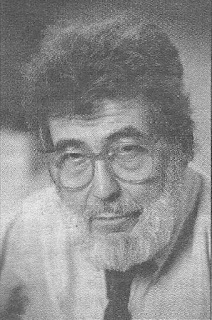This article originally appeared in the February
edition of The Interim, and is used with permission.
Nat Hentoff converted to
pro-life after investigating
medical evidence.
pro-life after investigating
medical evidence.
On Jan. 7,
jazz writer and civil libertarian Nat Hentoff passed away at the age of 91.
Hentoff, who began his writing career as a writer for Down Beat magazine in 1952 before becoming the jazz critic for The Village Voice in 1958, would later become
a passionate advocate for civil liberties and the rights of the unborn.
Born into -
a Jewish family in predominantly Catholic Boston in 1925, Hentoff would
eventually abandon his religious roots. He worked at a radio station upon graduating
from college before joining the staff of Down
Beat magazine. He would write a half-dozen books on jazz and review music
until he died, most recently for the Wall
Street Journal.
He was a
fierce First Amendment supporter, defending the principle of freedom of speech
in his columns in the Washington Post, The
New Republic, and elsewhere. He became a staff writer for The New Yorker and a regular contributor
to the humanist magazine Free Inquiry.
In 1993 he wrote a book, Free Speech for Me
- But Not for Thee: How the American Left and Right Relentlessly Censor Each
Other. He alienated many friends and allies for pointing out the hypocrisy
of individuals and organizations that selectively defended freedom of speech
for their side but not their political opponents. He served as a board member
of the Foundation for Individual Rights in Education which protects the free
speech rights of university students. Hentoff, a left-leaning libertarian,
shocked many of his friends when he came out against abortion in the early
1980s. Abortion had become a political issue during the Reagan presidency and Hentoff
said when he investigated the scientific and medical literature he had no
choice but to follow the inescapable conclusion that human life begins in the
womb and deserves, as a matter of human rights, legal protection. He went so
far as to say the political Left had betrayed its classical liberal principles in abandoning the human rights
of the preborn. Long a
speaker at local American Civil Liberties Union dinners around the country, Hentoff
observed, “once I declared myself a pro-lifer, all such invitations stopped."
In 1988, the
atheist would pen the biography of New York's Catholic leader, John Cardinal O'Connor: At the Storm Center
of a Changing American Catholic Church.
Hentoff said he greatly admired the man and once said, "I never could have
envisioned back when I was a kid in Boston, that a Cardinal and I would be, if not
breaking bread, at least breaking Scotch."
In 1992,
Campaign Life Coalition hosted a conference in Toronto, “Save the Planet's
People," with special guest Cardinal O'Connor. When CLC national president
Jim Hughes contacted Hentoff for some biographical information on the prelate, Hughes
recalled "Hentoff said he was coming to Toronto for the conference" to
support his friend. Hentoff ended up introducing the Cardinal at the conference
dinner, which attracted nearly 1000 people. Hentoff did not consider it
paradoxical that he was a pro-life atheist. He wrote in The New Republic in 1992, "Being without theology isn't the
slightest hindrance to being pro-life. As any obstetrics manual - Williams Obstetrics, for example - points
out, there are two patients involved, and the one not yet born should be given the
same meticulous care by the physician that we long have given the pregnant woman'."
In 2005, the
Human Life Foundation named Hentoff a Great Defender of Life. introducing
Hentoff at the HLF ceremony, anti-euthanasia lawyer Wesley Smith said,
"his unyielding stand over many years against abortion, infanticide,
euthanasia, experimentation, and the ongoing bioethical construction of a
"duty to “die" has made him a moral beacon for those who believe that
universal human liberty depends on society’s embrace of the intrinsic equality
of all human life.”

